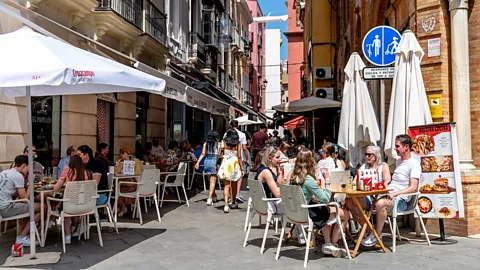The biggest travel trend for 2025? Staying away longer
 Getty Images
Getty ImagesWith TikTok tips to turn two days of annual leave into a five-day holiday and workers sneaking in meetings on the road, travellers are making their trips count – by making them last.
In August 2024, the director of a viral tourism advert for Oslo told the BBC he'd always prefer sitting at someone's kitchen table drinking milk to pit-stopping at tourist traps. This was, after all, the summer that tourism came back, and arguably the summer that tourism went too far, with bad traveller behaviour and troubling overtourism hitting many popular destinations. While the urge to get away doesn't seem to be dwindling, industry experts say travellers in 2025 are plotting longer stays and finding ways to stretch their time away from home and work to be as long as possible and further immerse themselves in a single destination.
According to Skift Research's 2025 Travel Outlook report, travel companies are anticipating a 24% rise in the number of trips people are planning for the year ahead compared to 2024. Globally, long leisure trips stand out as the most popular type of travel ahead of weekend getaways and road trips, with Skift's report calling 2025 "the year of long getaways". This is particularly true in China, India and Germany. In the US, one quarter of respondents said they expect to take a long international or cross-continental vacation this year, though slightly more expect to take shorter trips.
"Travellers are over the frenzy of taking photos in wildly packed tourist sites or iconic hotels just to say they've been there," explained Julia Carter, founder of luxury travel company Craft Travel. "Instead, they now increasingly recognise that when it comes to travel, a destination only really comes alive when you slow things down."
That slowdown is stretching to an average trip duration close to two weeks for luxury travellers, according to the Luxury Travel Report by Zicasso, another high end travel-planning company. Founder and CEO Brian Tan told the BBC, "[We've] noted a continued increase in average length of travel to 13.5 days, as well as more travellers preferring a single-destination personalised journey, where they can explore a culture more deeply, instead of multi-country trips." The trip duration increase has been a slow one (it's only up from 13.4 days average in 2024), but the report adds that 76.2% of respondents prefer single-country trips for 2025, which Zicasso has qualified as a "trend toward depth over breadth in travel experiences".
 Getty Images
Getty ImagesIf seeking out a quiet café or a photogenic overlook between meetings counts as depth, Skift's report also hails an increase in "blended travel", trips that include both work and leisure, which are occasionally referred to by the mush-mouth portmanteau of "bleisure".
By far the most respondents in India plan to travel this way (92%) then China (84%). Next on the list for work-and-play travel comes Germany (79% of respondents there aim to blend in 2025), followed by the US and the UK (both at 72%).
One way they may create time for longer trips to those shores is through the viral trend of "PTO [Paid Time Off] hacking". Strategic holiday planning to tack paid time off on days that surround federal holidays has surged in popularity on TikTok, where videos explain the best days to travel in 2025 to maximise trip length. Doing so allows travellers to extend their time off, a trick that's particularly useful in countries like the US, where the average full-time worker is allotted 11 days of paid vacation per year. One such TikTok went viral in late-2023, and copycats are a mainstay of the app heading into this year's travel-planning season, with search-friendly articles following suit. Travel & Leisure shares how to turn those 11 days into 44 travel days, and Forbes helps workers with 15 days of annual leave spend 55 days away.
 Getty Images
Getty Images"Many [people] are looking at when the public holidays are, and then taking their vacations around those holidays, such as Labor Day," says Paul Charles, CEO of The PC Agency, a PR and travel trade marketing consultancy. "Airlines are also offering better deals if you travel internationally around public holiday dates, encouraging Americans to travel overseas and not just within the US [during these times]." This chimes with another trend in Zicasso's report: an increase in travellers favouring shoulder seasons in 2025, spring (perhaps including the four-day week of Memorial Day) and autumn as opposed to prior years' summer peak.
One such traveller, Colombia-born Carolina Santos, who owns a wellness business in the US, treasures the long trips she's taken in Nepal and India. "Longer trips give me the time to truly immerse myself in the culture, to have deeper conversations with locals about their lives, customs and traditions," she tells the BBC. "It allows me to explore at a slower pace, without the rush or a fixed itinerary. The days unfold naturally, revealing the authentic rhythm of daily life in the places I visit."
--
If you liked this story, sign up for The Essential List newsletter – a handpicked selection of features, videos and can't-miss news, delivered to your inbox twice a week.
